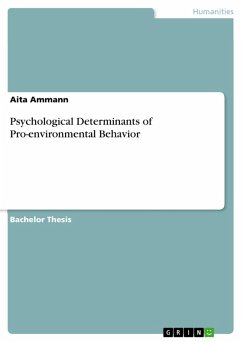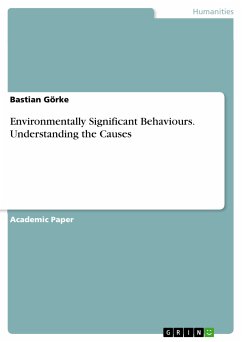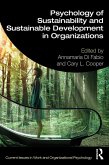Bachelor Thesis from the year 2022 in the subject Psychology - Personality Psychology, grade: 1.0 (6.0 Schweiz), University of Zurich (Psychologisches Institut), language: English, abstract: This paper aims at providing a comprehensive overview of all the psychological constructs relevant for pro-environmental behavior by integrating the findings of existing literature on the topic. It is organized into three main categories, being personality, judgment and guiding principles for action. These categories were chosen to distinguish between the enduring dispositional traits and qualities a person brings to tackling a problem - being broad, general individual differences that manifest across situations and are relatively stable over time (personality traits), how they perceive, evaluate and judge the problem (individual differences in cognitive schemes) and ultimately what drives them to take action and what guides them towards what actions they take. Climate change is one of the greatest global challenges of our time and most of the damage done to the natural environment is a direct consequence of human behavior. Although large-scale actions in the form of governmental policies, international agreements and technological inventions are needed, part of the solution to the problem are significant changes in individual's daily behaviors. Any behavior that aims at minimizing harm or benefitting the natural environment can be described as a pro- environmental behavior. Human behavior is very dynamic and influenced by a vast number of psychological and environmental factors, which makes it hard to understand and even harder to predict. Research on pro-environmental behavior has identified various psychological constructs as being related to pro-environmental behavior, such as problem awareness, personality traits, identity processes, personal and social norms, attitudes, intentions, behavioral control, values and there may be even more. However, primary studies typically only focus on a select few of the relevant psychological constructs and meta-analysis thus far have mainly focused on identifying the strengths of associations of different variables to pro-environmental behaviors. There is no existing framework that integrates all these variables and how they are connected into one comprehensive framework. A more holistic perspective on the individual and its behavior may thus provide a better understanding of what drives or impedes actions under what conditions.
Dieser Download kann aus rechtlichen Gründen nur mit Rechnungsadresse in A, B, BG, CY, CZ, D, DK, EW, E, FIN, F, GR, HR, H, IRL, I, LT, L, LR, M, NL, PL, P, R, S, SLO, SK ausgeliefert werden.









